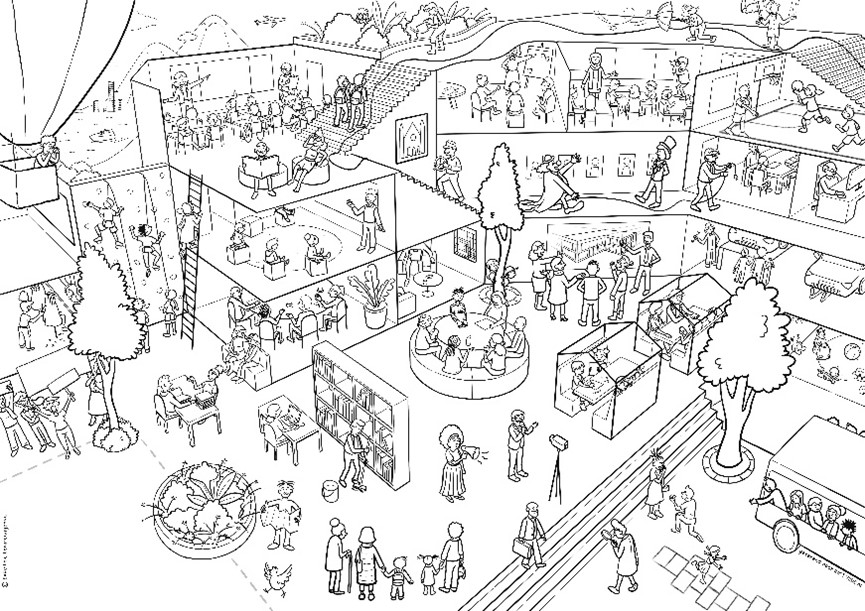The researcher inside me; the search for meaningful research in a shifting academic landscape

Subject based Professional Learning Communities in Israel
April 19, 2018
Can the culture of YouTube inform our practice in Teacher Education?
June 11, 2018The researcher inside me; the search for meaningful research in a shifting academic landscape


We are three university-based teacher educators who since many years have reflected on our development from teacher educators to teacher educators/researchers through collaborate self-study research. When Hanneke and Martine started a PhD trajectory, and Ari began to participate in the Academic School (a professional development school where innovation, practitioners’ research and teacher education are combined), we came to realize that we were crossing the boundaries between the ´Educational Field`, and ´The Research Tower` and we decided to explore the learning potential of the concept of boundary crossing. Boundary crossing usually refers to transitions and interactions of one or more persons across different sites (Suchman, 1994). Boundary crossing can be challenging. It often requires professionals to “enter into territory in which we are unfamiliar and, to some significant extent therefore unqualified” (Suchman, 1994, p. 25) and “face the challenge of negotiating and combining ingredients from different contexts to achieve hybrid situations” (Engeström et al., 1995, p. 319).
Transitions
Exploring the concept of Boundary Crossing helped us to identify three types of transitions that were going on simultaneously, and differently, for all three of us:
- Changes in professional identity
- Changes in interacting with the context
- Changes in our relationship to different contexts
To illustrate the interconnectedness of these three transitions we provide some examples: as teacher educators we came from a world where positive feedback and personal growth are important pedagogical values and where relations are more informal. The world of research was, at least at first, identified as competitive, full of (unknown) procedures, and focused on scientific output instead of educational improvement. Also, as teacher educators we had to find out how to handle the move from our embedded position in the educational world to our novice position in the new world of research.
Reflections
Looking back 10 years later, we now notice that feeling at home in “The Research Tower” has different meanings for each of us, and in our discussions we agreed to disagree about the two worlds. Hanneke experienced a lack of teamwork in the research world and created her own research team. Martine had gained by the teamwork in the academic setting, and Ari mostly tried to find his own pathway. Working with the Academic School he was also confronted with a traditional, ‘Ivory Tower’ image of research. He stimulated teachers and student teachers to create new and alternative perspectives on carrying out meaningful practitioner research.
We had to learn to relate to the traditional world of research, we did that in different ways, and we are still in different stages of the transition process. All of us not only learned a lot from our collaborative self-study journey in this boundary crossing process, our work together also functioned as a lifeline.
We found out that openly and honestly discussing different perspectives on research helped us to be more accepting towards different paradigms and approaches. As we operated in a safe environment, trusting each other to handle confessions about delicate situations appropriately, we gained more insights about different takes on research and we opened up to researcherly motives different from our own. Also, maintaining contact and stimulating each other in being productive (i.e. explicating our findings in articles and conference contributions), assisted us in getting more insight in how time can change your perspective on struggles in transitions.
References
Akkerman, S. F., & Bakker, A. (2011). Boundary crossing and boundary objects. Review of educational research, 81(2), 132-169.
Engeström, Y., Engeström, R., & Kärkkäinen, M. (1995). Polycontextuality and Boundary Crossing in Expert Cognition: Learning and Problem Solving in Complex Work Activities. Learning and Instruction 5(4), 319-336.
Suchman, L. (1994). Working relations of technology production and use. Computer Supported Cooperative Work, 2, 21-39.


 Ari de Heer is a teacher educator at the Graduate School of Teaching of University of Utrecht. He developed tailor-made courses and worked with second career teachers. His research interest are Self-Study and teachers researching their own practises. He is also a teacher at an Academic School. He has a more holistic view on education.
Ari de Heer is a teacher educator at the Graduate School of Teaching of University of Utrecht. He developed tailor-made courses and worked with second career teachers. His research interest are Self-Study and teachers researching their own practises. He is also a teacher at an Academic School. He has a more holistic view on education.  Martine M. van Rijswijk is a teacher educator, coordinator and researcher at the Graduate School of Teaching of Utrecht University (the Netherlands). In her research, she focuses on student teacher development and sense making processes, both on an intrapersonal as well as an interpersonal level. Her interests also include teacher educator identity and expertise.
Martine M. van Rijswijk is a teacher educator, coordinator and researcher at the Graduate School of Teaching of Utrecht University (the Netherlands). In her research, she focuses on student teacher development and sense making processes, both on an intrapersonal as well as an interpersonal level. Her interests also include teacher educator identity and expertise. Hanneke Tuithof is a teacher educator in history at Utrecht University (the Netherlands). Her PhD project was focused on the Pedagogical Content Knowledge of experienced history teachers in the context of a curriculum innovation. In June 2017 she finished this PhD project and became professor at the University of Applied Sciences Fontys in Tilburg. She combines this position with her work as a teacher educator at Utrecht University. She continues her research on Pedagogical Content Knowledge.
Hanneke Tuithof is a teacher educator in history at Utrecht University (the Netherlands). Her PhD project was focused on the Pedagogical Content Knowledge of experienced history teachers in the context of a curriculum innovation. In June 2017 she finished this PhD project and became professor at the University of Applied Sciences Fontys in Tilburg. She combines this position with her work as a teacher educator at Utrecht University. She continues her research on Pedagogical Content Knowledge.

